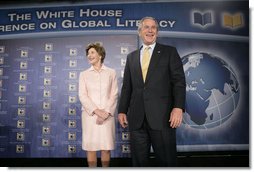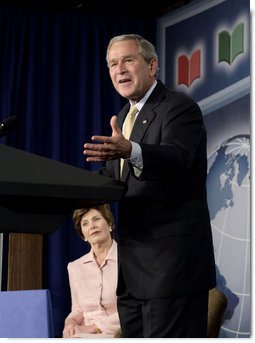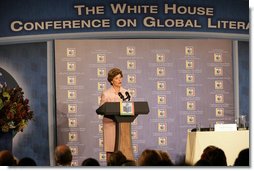
 |
For Immediate Release
Office of the Press Secretary
September 18, 2006
President and Mrs. Bush Attend White House Conference on Global Literacy
New York Public Library
New York, New York
![]() White House Conference on Global Literacy
White House Conference on Global Literacy
12:10 P.M. EDT
MRS. BUSH: Thank you all so much. Thank you very much. Thanks a lot. (Applause.) Have a seat, everyone. Thank you all very much. Thanks, everybody. You all can have a seat. I want to thank all the terrific panelists today for sharing your experiences and your expertise. I want to thank everyone in this room for your commitment to literacy.
 Today, we heard about the three most important benefits of reading:
Literacy instruction for women improves educational opportunities for
their children -- women who can read are advocates for their children's
education; literacy helps adults make informed decisions to protect
their health and the health of their children; and literacy helps adults
-- women and men -- learn the basic financial skills that generate
income, that foster independence, and that boost local economies. If
more countries invest in literacy programs like the ones we've heard
about today, the benefits of reading can be enjoyed by every country.
The leaders of every government must commit themselves to this cause.
Today, we heard about the three most important benefits of reading:
Literacy instruction for women improves educational opportunities for
their children -- women who can read are advocates for their children's
education; literacy helps adults make informed decisions to protect
their health and the health of their children; and literacy helps adults
-- women and men -- learn the basic financial skills that generate
income, that foster independence, and that boost local economies. If
more countries invest in literacy programs like the ones we've heard
about today, the benefits of reading can be enjoyed by every country.
The leaders of every government must commit themselves to this cause.
Now I'd like to introduce a leader I know is dedicated to improving literacy and education: Ladies and gentleman, my husband, President George Bush. (Applause.)
THE PRESIDENT: Thank you all. Thank you for attending this important conference. I look around the room and see some familiar faces -- my mother. (Laughter.) How are you doing? It's good to see you. My mother-in-law. (Laughter.) Both of these ladies have instilled a great passion for literacy not only in Laura and me, but for others around our country. Thank you all for coming. Laura, thank you for your leadership.
Laura believes strongly in the power of literacy to change societies. And that's really what we're here to talk about. The capacity of -- the simple act of teaching a child to read, or an adult to read has the capacity to transform nations and yield the peace we all want.
So I want to thank you for being here. I particularly want to thank the First Ladies who are here, and the ministers from different governments around the world. We're really proud you've taken time to join us here today.
As you probably can tell, our government takes this initiative seriously. After all, we've got the Secretary of State, Condoleezza Rice, and the Secretary of Education, Margaret Spellings, both here. It should say to people loud and clear that, when you combine the resources of the Department of Education and the State Department, that we're serious about helping global literacy. And then we've added Randy Tobias, who's the head of USAID. He's the fellow who's got the responsibility of handing out some money -- (laughter) -- which is what we're doing, because we believe strongly in this initiative. So I want to thank you all for taking time out of your busy schedules to send a clear message to folks.
 I want to thank Mr. Matsuura of UNESCO. Thank you, very much, for
serving. Thanks for leading this vital organization. We want to work
with you. And I see you're sitting next to one of my great friends --
the Ambassador, Karen Hughes, is here, as well.
I want to thank Mr. Matsuura of UNESCO. Thank you, very much, for
serving. Thanks for leading this vital organization. We want to work
with you. And I see you're sitting next to one of my great friends --
the Ambassador, Karen Hughes, is here, as well.
I want to thank Paul LeClerc of the -- of this fantastic library. Isn't this a wonderful place to meet? Obviously, it makes sense to meet in a library if you're going to talk about literacy. It's really one of the most special spots here in New York. And I also want to thank Catie Marron for allowing us to use this facility. She's the chairman of the board, and Paul, of course, is the president and CEO of the New York Public Library.
I want to thank those who have participated in panels. I had the honor of meeting some of the panelists and the panel leaders. I met Gerri Elliot, who is a corporate vice president of Microsoft. The reason I bring up Gerri Elliot is because, in America we believe that there is a combined responsibility to help. We believe government has got a vital role, but we also believe corporate America and our citizens have got a vital role to play in helping others benefit from learning how to read. And so I want to thank Gerri for setting such a good example.
I call upon others in our country to understand the importance of this initiative and to step forth. After all, a literacy initiative will help spread prosperity and peace. And that's really why we're here at the UNGA. I've been looking forward to coming here. As you know, it's an annual event. Every year I get to come. It gives me a chance to meet with fellow leaders, and it gives me a chance to clearly explain, the goals of this country are to help those who feel hopeless; the goals of this country are to spread liberty; the goals of this country is to enhance prosperity and peace.
You can't have prosperity unless people can read. It's just as simple as that. You know, one of things that we have committed ourselves to in America is to help eradicate persistent poverty. But there is a direct link between illiteracy and persistent poverty. Oftentimes when we're talking about prosperity and helping this world become a more prosperous place, we tend to focus only on trade. And no question, good trade agreements and tearing down the barriers that prevent the free flow of goods will help enhance prosperity. But you can't be a prosperous nation if you don't have people who can read.
 I mean, think about it, it's pretty clear; in order to be an
informed consumer you have to read. In order to be able to take
advantages of jobs that may come to your country as a result of
expanding economic opportunity, you've got to read. In order to be a
productive worker, you have to be able to read the manual. And so part
of this initiative, part of the practical application of this initiative
is to encourage prosperity by enhancing people's capacity to read. And
I want to thank you for your focus on that important issue.
I mean, think about it, it's pretty clear; in order to be an
informed consumer you have to read. In order to be able to take
advantages of jobs that may come to your country as a result of
expanding economic opportunity, you've got to read. In order to be a
productive worker, you have to be able to read the manual. And so part
of this initiative, part of the practical application of this initiative
is to encourage prosperity by enhancing people's capacity to read. And
I want to thank you for your focus on that important issue.
I also strongly believe that those of us who have the benefits of living in free society must help others realize the benefits of liberty. I believe that. I believe that's part of America's responsibility in the world. I realize we can't impose our vision of government, nor should we try. But we believe here in America in the universality of freedom. We don't believe freedom belongs only to the United States of America; we believe that liberty is universal in its applications. We also believe strongly that as the world becomes more free, we'll see peace. That's what we believe. And we're going to act on those beliefs.
But one thing that's for certain: It is very hard to have free societies if the citizens cannot read. Think about that. It's much harder for a society to realize the universal blessings of liberty if your citizens can't read the newspaper in order to be able to make informed choices and decisions about what may be taking place in a country. You can't realize the blessings of liberty if you can't read a ballot, or if you can't read what others are saying about the future of your country.
I am deeply concerned about the spread of radicalism, and I know you are, as well. We long for the days when people don't feel comfortable or empowered to take innocent life to achieve an objective. One reason radicals are able to recruit young men, for example, to become suicide bombers, is because of hopelessness. One way to defeat hopelessness is through literacy, is to giving people the fantastic hope that comes by being able to read and realize dreams.
So this literacy initiative is vital as far as the United States of America is concerned, and we want to help. That's what I'm here to say. I want to thank you for being here and let you know that we want to lend our help.
I know Laura talked about our initiative on the continent of Africa. It is a firm, real, dedicated commitment to helping folks become literate. We share -- we have that same sense of commitment in more places than Africa. For example, in our own neighborhood, we are deeply concerned about illiteracy, and we believe it's in our national interest to help folks become literate in Central and South America.
One of the most, I guess, heartwarming literacy initiatives that I have witnessed as President was the Women's Teacher Training Institute in Kabul. I know there's some people from Afghanistan here, and I want to thank you for your courage and your bravery. I don't know if you know what the institute has been doing, but think back to the days prior to liberation when women really weren't let out of the house. Young girls couldn't go to school. There was an underground teacher movement because of the great passion teachers feel for -- feel for their students. And so after the liberation of the country, we have worked with that institute to teach trainers -- teach teachers how to teach, in the knowledge that when they leave the institute, they'll then go to the village.
It's kind of this cascading movement of skill so that people can fulfill their compassion, fulfill their dreams about a more literate Afghanistan. This young democracy will survive. And one of the reasons it will survive is because of the committed effort by a lot of folks, not just the United States, but by people around the world to help the brave educational entrepreneurs that recognize hope and peace come about as a result of education.
We -- a lot of times you hear a lot of words -- people are pretty good talkers in this society of ours. People step up and make promises and kind of flowery statements. I want it to be said that our government is doing more than just talking, that our government is willing to act. We've doubled the development assistance since I've been the President. We have set forth what's called the Millennium Challenge Account. We said we were going to help people, particularly those who fight corruption, those who believe in markets, but equally importantly, those who invest in the education and health of their citizens.
We believe strongly that this world must confront the pandemic of HIV/AIDS, and believe that to whom much is given, much is required in order to solve disease and poverty -- a lot of it brought about because -- a lot of that poverty brought about because of illiteracy.
And so one thing I'd like to take away from today is, one, we're committed. We believe that the United States of America must not isolate ourselves from the problems of the world. We believe we have an opportunity to help you solve problems of the world.
There is nothing more hopeful, there's no greater gift than to teach a person to read. When I was the governor of Texas, I remember an African American woman walking up to me, and we were talking about the importance of teaching every child to read -- not just a few, but every child to read. We believe in America that reading shouldn't be the right of just a few people, it ought to be -- it's universal, as well. And the woman walked up to me, and she said, "Mr. Governor," she said, "I want you to understand how people in my community feel." She said, "Reading is the new civil right." I feel the same way about global literacy. Reading will yield the peace we want.
So thanks for coming. God bless. (Applause.)
END 12:22 P.M. EDT